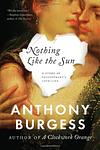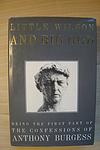Anthony Burgess
Anthony Burgess was an English writer and composer. He is best known for his novel 'A Clockwork Orange', which was later adapted into a film by Stanley Kubrick. Burgess's work is characterized by a fascination with language and its uses, as well as satirical and dystopian themes. He was also a prolific literary critic and composed over 250 musical works. Burgess's influence on literature and culture extends beyond his most famous novel, with a diverse body of work that spans multiple genres.
Books
This list of books are ONLY the books that have been ranked on the lists that are aggregated on this site. This is not a comprehensive list of all books by this author.
-
1. A Clockwork Orange
This novel follows the life of a violent young man named Alex, who is part of a youth subculture in a dystopian future England. Alex and his gang engage in a nightmarish spree of rape, assault, and robbery, until he is arrested and subjected to a psychological experiment by the government to "cure" him of his violent tendencies. The novel explores themes of free will, morality, and the nature of evil, while using a unique slang language invented by the author.
-
2. Earthly Powers
"Earthly Powers" is a sprawling, complex novel that explores the intertwined lives of a homosexual British writer and an Italian-American Cardinal over the course of the 20th century. The narrative delves into themes of faith, homosexuality, and the nature of evil, while also providing a critique of modern society. It's a vivid tapestry of historical events, including two World Wars and Vatican II, providing a backdrop for the personal and spiritual struggles of its protagonists.
-
3. Inside Mr. Enderby
The novel is a satirical exploration of the life of a reclusive and eccentric poet named Mr. Enderby who lives in solitude, only leaving his apartment to buy food and liquor. His life is disrupted when a meddling psychiatrist falsely diagnoses him with a mental disorder and forces him into society, leading to a series of misadventures. Throughout the book, the protagonist's struggle to balance his creative process with societal norms and expectations is humorously depicted.
-
4. Nothing Like the Sun
"Nothing Like the Sun" is a historical novel that brings to life the love story of William Shakespeare and the mysterious Dark Lady who inspired many of his sonnets. The narrative explores Shakespeare's life and times, his relationships, his creative process, and his struggles with fame and fortune. The book is known for its rich and imaginative language, reflecting the linguistic brilliance of the Bard himself.
-
5. The End Of The World News
This novel is an ambitious and unconventional triptych that interweaves three distinct narratives: the psychoanalytic adventures of Sigmund Freud, the escapades of Leon Trotsky aboard a ship to New York, and a science fiction tale about the impending collision of Earth with a rogue planet. Through a daring blend of historical fiction, political drama, and speculative storytelling, the book explores themes of human desire, societal upheaval, and the existential threats facing civilization. Its innovative structure and the juxtaposition of seemingly disparate stories challenge readers to consider the interconnectedness of personal, political, and cosmic destinies.
-
6. Little Wilson and Big God
"Little Wilson and Big God" is the first volume of a two-part autobiography that covers the early life of a renowned British writer and composer. The book explores his upbringing in Manchester, his education, his service in the British Army during World War II, and his early career as an education officer in Malaya and Borneo. The narrative delves into his relationships, struggles with alcoholism, and his passion for music and literature, offering a deeply personal and revealing look into the formative years of a multifaceted artist.





